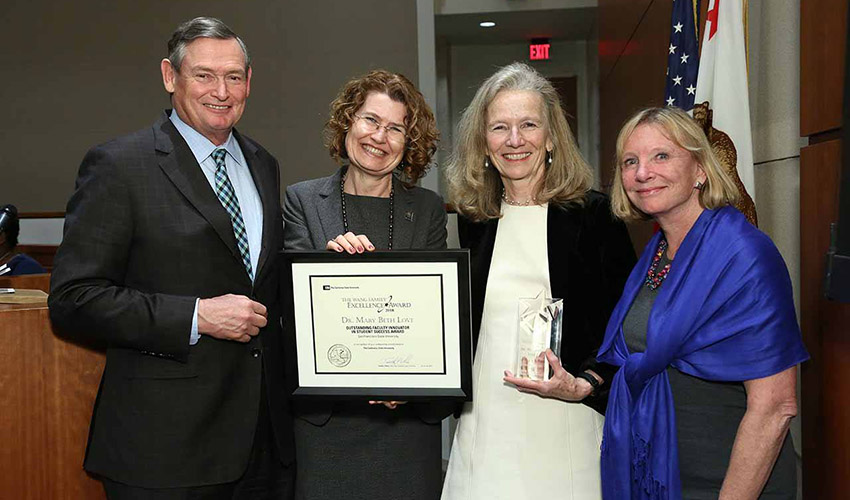Founder of Metro success program receives CSU's Wang Family Excellence Award

Left to right: CSU Chancellor Timothy P. White, SF State Interim Provost Jennifer Summit, Professor Mary Beth Love, CSU Board of Trustees Chair Rebecca D. Eisen.
SF State Professor of Health Education Mary Beth Love honored for groundbreaking program
By Lisa Owens Viani
A passion for equity in higher education has driven Mary Beth Love’s groundbreaking work over the past 30 years as a professor in San Francisco State University’s Department of Health Education. In recognition of her founding and growing the Metro Academies College Success Program (Metro), California State University (CSU) Chancellor Timothy P. White will honor Love with the Wang Family Excellence Award for Outstanding Faculty Innovator in Student Success on January 30, 2018.
Established by CSU Trustee Stanley T. Wang and his family in 1998, the annual award recognizes four outstanding faculty members and one staff member in the CSU system who have distinguished themselves through exemplary achievements in various academic disciplines.
“I’m incredibly honored and humbled,” said Love. “This honor belongs to many people as it took the entire SF State community to bring this program from where it started to where it is now, with Academies in every College. The program’s success is the result of an incredible team working very hard with our wonderful students to make learning exciting and graduation within reach.”
Alex Urbina, a senior in the program who grew up in the Bayview district of San Francisco, said the program changed the course of her life. “I am a first-generation college student, and this program — the academics, advising and tutoring — made my experience 10 times easier. I want to get a job in education and help students get into college with the skills that helped me.”
Love founded Metro in partnership with City College in 2007 after noticing that many students entering the public health education major didn’t have the tools they needed to succeed. With help from Vicki Legion, her counterpart at City College and director of the Metro Transfer Success program there, Love reconfigured the first two years of college. Metro creates student communities with shared academic or career interests in a “school within a school” for up to 140 first generation, low-income, or underrepresented students each year. The cohort of students enrolls together in two linked general education classes each semester during those two years. An engaging curriculum uses real-world challenges to strengthen the core academic skills of writing, quantitative reasoning, oral communications and critical thinking.
“Critical thinking and writing are skills that improve with repeated practice over time,” said Love. “This curriculum provides students with the time and support they need to do that.” Love says the curriculum empowers students to use their education to improve not only their own lives but also those of people in their communities and broader society. “We want to impart a love of learning and help them build a secure sense of self as scholars and agents of change,” said Love. By discovering how learning is relevant to them and their families, the students become more excited about learning.
Metro has led to a sharp improvement in retention and graduation rates of disadvantaged students, with 60 percent of its students graduating within six years, compared to just 45 percent of a similar group of students not in the Metro program. The Metro four-year graduation rate is 22 percent compared to 7.7 percent of the comparison group.
Republished from SF State News